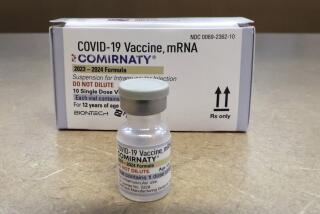Panel Wants Vaccine to Be Routine
Federal health experts recommended Thursday that all 11- to 12-year-old girls routinely get a newly approved cervical cancer vaccine, paving the way for private insurers and the federal government to pay for shots that could save thousands of lives in the U.S. each year.
The Advisory Committee on Immunization Practices also said females ages 9 to 26 could receive the vaccine on the advice of their doctors.
âThis is a huge breakthrough for womenâs health,â Dr. Anne Schuchat, director of the National Center for Immunization and Respiratory Diseases, said after the unanimous vote by the expert committee.
The focus now moves to individual states, which must decide whether to mandate the vaccine for school attendance.
Womenâs health experts argue that requiring the vaccine is the most effective way to combat the disease.
âUnless you force people to get it, penetration is low,â said Cosette Wheeler of the University of New Mexico, who conducted clinical trials of the vaccine.
But some educators and conservative groups say decisions about the vaccine should be left to parents.
âWe think this is a matter of parental rights and parental control,â said Peter Sprigg of the conservative Family Research Council. âParents have the rights to make these decisions for their kids.â
Called Gardasil, the vaccine blocks four types of the human papillomavirus, or HPV, two of which are believed to be responsible for 70% of the 15,000 cervical cancer cases diagnosed in the U.S. each year. Worldwide, 400,000 women are diagnosed with cervical cancer each year, and half die.
The four types of HPV blocked by Gardasil cause 90% of genital warts.
The vaccine is most effective when administered to girls before they become sexually active. According to the national Centers for Disease Control and Prevention, 26% of girls have had intercourse by age 15.
Health experts said the vaccine could go a long way toward reducing the 4,000 cervical cancer deaths that occur in the U.S. each year.
Manufactured by Merck & Co., the vaccine is among the most expensive ever produced. A full three-shot series costs $360.
Although private insurers and the federal Vaccines for Children program will cover the vast majority of females, Claire Hannan, director of the Assn. of Immunization Managers, said thousands still fall between the cracks. They include those whose insurance plans donât cover vaccines or have high deductibles. The federal program also does not cover people older than 18.
To provide the vaccine to everyone who should get it, the states would have to pay for those who could not afford it.
Dr. Leah Devlin, state health director for North Carolina and president of the Assn. of State and Territorial Health Officers, said most states did not have the money.
She said the cost of providing Gardasil to all 11- and 12-year-old girls would nearly double her stateâs vaccine budget, which already had trouble paying for required vaccines.
The federal committeeâs recommendation will become policy if it is accepted by the CDC, which normally follows the recommendations of its advisory panel.
The CDCâs approval is expected in a matter of weeks.
Two national health insurers, Aetna and WellPoint, the parent of Blue Cross of California, said they would follow the committeeâs recommendations and begin reimbursing for the vaccine immediately.
Cost isnât the only obstacle to widespread adoption of the vaccine. In California, for example, legislation is required to mandate a shot.
Conservative groups have opposed requiring the vaccine, saying it might send young girls an implicit message condoning sex before marriage.
Some school officials also objected, noting that only three vaccines -- those against polio, diphtheria and measles -- were required in all 50 states.
âThis is not a communicable disease that would keep kids out of school like mumps or rubella,â said Gerald Tirozzi, executive director of the National Assn. of Secondary School Principals, whose members include middle school and high school administrators.
âTo make this a condition to enter school -- I think parents would become very upset, and many would see this as a signal to their daughters that they can become sexually active,â Tirozzi said. âI think there would be a lot of push-back.â
More to Read
Sign up for Essential California
The most important California stories and recommendations in your inbox every morning.
You may occasionally receive promotional content from the Los Angeles Times.









